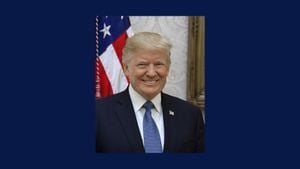BRICS, the coalition of rapidly developing economies, marked a significant expansion with the recent admissions of Nigeria and Indonesia as full members. This move, which occurred at the start of 2025, not only enhances the bloc's influence but also cements its role as a prominent representative of the Global South.
Nigeria, now officially confirmed as the tenth member of BRICS as of January 17, 2025, is noteworthy for its demographic and economic clout. With the world’s sixth-largest population and being Africa’s largest economy, Nigeria is expected to significantly boost BRICS' global presence. Similarly, Indonesia, which joined earlier on January 7, 2025, as the first Southeast Asian country to gain membership, adds to the coalition’s weight with its substantial economy and population.
This expansion means BRICS now embodies 54.6% of the world's population, shifting global dynamics significantly. The ten full members of BRICS are Brazil, Russia, India, China, South Africa, Egypt, Ethiopia, Iran, the United Arab Emirates, and Indonesia. Notably, with Nigeria's admission, BRICS has also welcomed nine other partner countries who are on the pathway to full membership, including Bolivia, Cuba, Kazakhstan, Malaysia, Thailand, Uganda, and Uzbekistan.
The Brazilian Government emphasized the goals of BRICS, stating, "BRICS has two main goals: strengthening South-South cooperation and reforming global governance." This agenda reflects the bloc's increasing significance as voices for developing nations grow louder on the global stage. By advocating for reform within established global institutions, BRICS aims to counteract the power dynamics traditionally led by Western nations.
Indonesia’s inclusion is particularly strategic; it strengthens the bloc's representation from Southeast Asia and aligns with Brazil’s commitment to deepen cooperation among developing nations. Indonesia's Ministry of Foreign Affairs noted the membership as “a strategic step to improve the collaborations and cooperation with other developing nations, based on the principle of equality, mutual respect, and sustainable development.” Economically, this could translate to enhanced access to BRICS markets and forecasting GDP growth for Indonesia.
The expanded BRICS, now representing nearly half of the global population, will significantly impact global trade and finance systems. Notably, during the recent summit held in Kazan, Russia, BRICS members discussed the importance of promoting trade settlements using local currencies, thereby challenging the monopoly of the US dollar. If successful, this could fundamentally alter the financial landscapes of not only BRICS members but also their trading partners.
This potential to de-dollarize international trade—particularly concerning commodities like oil—is significant. Nigeria is Africa's top oil producer and among the world’s top fifteen producers. Collectively, BRICS members account for over 30% of global oil production. With the continued alignment of interests among these members, shifting their global economic standing seems increasingly plausible.
Historically, the BRICS grouping originated from the acronym “BRIC,” which was coined back in 2001. The formal establishment of BRICS came together later, playing a substantial role during the 2008 financial crisis and challenging the efficacy of the US-led Bretton Woods institutions. Members pooled their resources to form support networks like the New Development Bank (NDB) and the Contingent Reserve Arrangement (CRA), which aim to provide financial stability among member states.
At the recent 16th BRICS Summit, the organization reiterated its commitment to advancing developmental goals through collaborative efforts across various sectors. This marks BRICS' evolution from just a geopolitical alliance to becoming a formidable player capable of establishing alternative frameworks for global governance. The revitalized push to include more states under the BRICS umbrella reflects this growing significance and ambition.
Nonetheless, the expansion of BRICS is not devoid of challenges. The diversity of member nations, each having unique economic interests and political agendas, demands strategic consensus. The long-term effectiveness of BRICS will hinge on its ability to balance these divergent interests and maintain unity. The bloc must navigate internal and external pressures, ensuring it emerges as a coherent actor on the world stage.
While projections indicate BRICS will account for 37.6% of world GDP at purchasing power parity by 2027, comparison with the G7's 28.2% GDP signifies the shifting tides of economic power. Going forward, BRICS is poised not just to challenge the established economic hierarchy but to reshape the narratives within institutions like the UN and WTO.
With the world watching, the actions of BRICS will not merely redefine its members’ economic landscapes but could lead to tangible changes to global governance systems, showcasing the growing influence of the Global South. The first signs of this new order will depend on how effectively BRICS leverages its collective strength to build alliances and address the common challenges facing member states.



